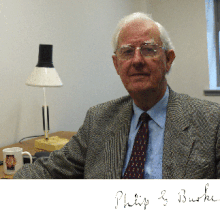| This article needs additional citations for verification. Please help improve this article by adding citations to reliable sources. Unsourced material may be challenged and removed. Find sources: "Philip George Burke" – news · newspapers · books · scholar · JSTOR (May 2021) (Learn how and when to remove this message) |
| Philip George BurkeCBE | |
|---|---|
 | |
| Born | 18 October 1932 |
| Died | 4 June 2019 |
| Alma mater |
|
| Known for | R-matrix method |
| Scientific career | |
| Institutions | Queen's University Belfast |
Philip George Burke FRS (18 October 1932—4 June 2019) was a British theoretical and computational physicist who developed the R-matrix method for studying electron collisions with atoms and molecules.
Life
He was born in London. He graduated from University College of the South West, and University College London. He worked at the National Physical Laboratory, Teddington. From 1959 to 1960, he worked at the Lawrence Berkeley Radiation Laboratory.
The majority of Burke's research career was based at Queen's University Belfast, where he was a member of the Centre for Theoretical Atomic, Molecular and Optical Physics.
He was elected Fellow of the Royal Society in 1978 and was awarded a CBE in 1993.
References
- ^ Hibbert, Alan (2021). "Philip George Burke. 18 October 1932—4 June 2019". Biographical Memoirs of Fellows of the Royal Society. 70: 57–77. doi:10.1098/rsbm.2020.0043. S2CID 232326782.
This article about a physicist of the United Kingdom is a stub. You can help Misplaced Pages by expanding it. |